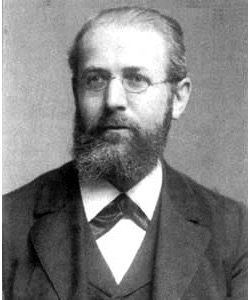
Dec. 11, 2017
Speaker: Fei Qi
Title: Meromorphic open-string vertex algebras and pole conditions
Abstract: Meromorphic open-string vertex algebra is a noncommutative generalization of vertex algebras. More precisely, it is the algebraic structure formed by vertex operators that are associative but not commutative. Because of the lack of commutativity, the rationality of products of any number of vertex operators (n-rationality hereafter) does not follow from the rationality of products of two vertex operators (2-rationality hereafter). I will show that if the correlation function defined by the product of two vertex operators satisfies certain pole condition, then 2-rationality implies n-rationality.
Dec. 4, 2017
Speaker: Jason Saied
Title: Extended Affine Lie Algebras and Their Root Systems
Abstract: We will give definitions of extended affine root systems (EARS) and extended affine Lie algebras (EALAs). We will then use the notion of a semilattice in order to give constructions of all EARS. We will construct examples of EALAs and study whether every EARS arises as the root system of some EALA.
Nov. 27, 2017
Speaker: Johannes Flake
Title: Quantum Schur-Weyl duality and link invariants
Abstract: We will describe two classes of algebras, quantum groups and Hecke algebras, and we will see that they are related through a quantum version of Schur-Weyl duality. We will use both classes of algebras to generate link invariants, such as the Jones polynomial and the HOMFLYPT polynomial.
Nov. 20, 2017
Speaker: Zhuohui Zhang
Title: Intertwining Operators for Principal Series and Unitarizability
Abstract: The principal series representations plays a role as standard objects for $(\mathfrak{g},K)$-modules, which carries enough information to determine the unitarizability of a representation the corresponding real reductive group $G$. I will talk about results in the computation of this bilinear form via intertwining operators between principal series, and some rank 1 examples.
Nov. 13, 2017
Speaker: Sven Moeller
Title: Vertex Operator Algebras, Modular Forms and the Verlinde Formula
Abstract: I will describe important topics in the representation theory of vertex operator algebras (VOAs). Under certain regularity assumptions the graded dimensions (or characters) of VOAs and of their irreducible modules are modular forms. As such they transform in a certain way under the action of SL_2(Z) on the complex upper half-plane. The miraculous Verlinde formula provides a relation between the image of a certain matrix S under this action and the fusion rules of the irreducible modules.
Nov. 6, 2017
Speaker: Kelly Spendlove
Title: Computing Connection Matrices
Abstract: Algebraic topology and dynamical systems are intimately related: the algebra may constrain or force the existence of certain dynamics. Morse homology is the prototypical theory grounded in this observation. Conley theory is a far-reaching topological generalization of Morse theory and a great deal of effort over the last few decades has established a computational version of the Conley theory. Within the Conley theory the connection matrix is the mathematical object which transforms the approach into a truly homological theory; it is the Conley-theoretic generalization of the Morse boundary operator. We'll discuss how the connection matrix can be computed efficiently using some tools from algebraic topology and order theory. The ability to compute this boundary operator turns the computational Conley theory into a computational homology theory for dynamical systems.
Oct. 30, 2017
Speaker: Robert Laugwitz
Title: Non-commutative symmetric functions
Abstract: This will be an accessible introductory talk on the theory of quasi-determinants of Gelfand--Retakh and how they can be used to define analogue of symmetric functions over free non-commutative skew-fields. In particular, there are many different bases for the Hopf algebra of non-commutative symmetric functions giving analogues to the classical bases of elementary symmetric functions, complete homogeneous functions, power sums, or Schur functions.
Oct. 23, 2017
Speaker: Saurabh Gosavi
Title: Central Simple algebras, Brauer group and splitting fields
Abstract: A Central simple algebra is a matrix algebra with entries in a finite dimensional division algebra over a field. We can put a group structure on the collection of central simple algebras, called the Brauer group. We will talk about whether we can "distinguish" elements in the Brauer group of rational numbers via their splitting fields. In the end, I will briefly try to explain the stuff that I have been thinking about and rant a bit about the slow progress.
Oct. 16, 2017
Speaker: Alejandro Ginory
Title: Double Affine Weyl Groups, Congruence Subgroups, and Affine Kac-Moody Lie Algebras
Abstract: The representation theory of important types of Lie algebras involve certain discrete groups called Weyl groups. Amongst these Lie algebras are the affine Kac-Moody Lie algebras which give rise to the so-called affine Weyl groups. A natural extension of these Weyl groups are the double affine Weyl groups. We will discuss how double affine Weyl groups admit a simple presentation, similar to those of Coxeter groups, that are naturally related to congruence subgroups of SL(2,Z) and characters of affine Kac-Moody Lie algebras (twisted and untwisted).
Oct. 9, 2017
Speaker: Semeon Artamonov
Title: Genus Two analogue of A_1 spherical DAHA
Abstract: I will start by reviewing on how A_{n-1} spherical DAHA arise in the quantization of the moduli space of SU(N) flat connections on a torus. I will then define the corresponding notion for the case of SU(2) flat connections on a genus two surface. In particular, I will define a family of Laurent polynomials which form a basis of common eigenfunctions of certain commuting q-difference operators. This family contains A_1 Macdonald polynomials as a subclass. I will then define a genus two analogue of A_1 spherical DAHA and show that the Mapping Class Group of a genus two surface acts by outer automorphisms of this algebra.